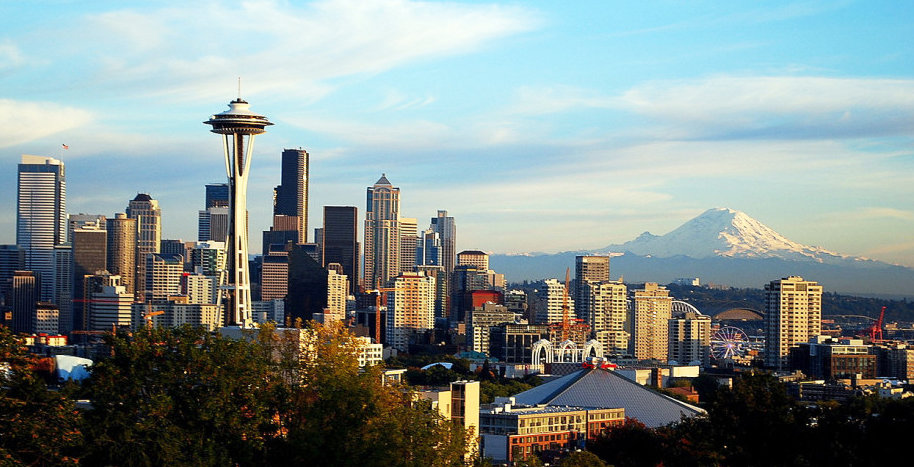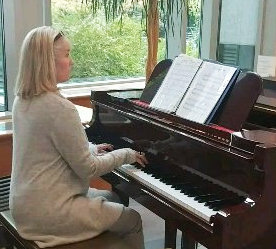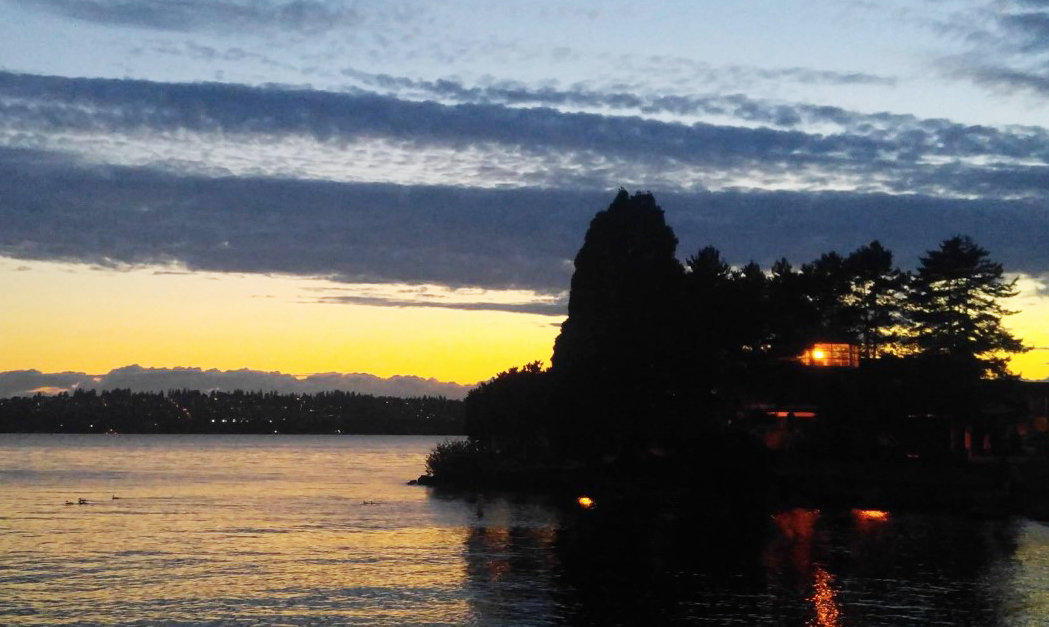Unsettled in Seattle
A month living at the first U.S. epicenter of the coronavirus
KIRKLAND, Wash. – The myth of Orpheus lifting his lyre to enchant the world, inducing animals, trees, and even rocks to dance, only sounded far-fetched. Music has healing powers, I’d always believed. Moonlighting as a pianist at cocktail parties could often be less fulfilling for me than serving as a volunteer piano player in the sun-soaked atrium lobby of a community hospital.
When visitors hung out anxiously waiting for new babies to be born and arrive in the maternity ward upstairs, I’d hope to reassure them by serving up “A Child is Born,” the lilting jazz-waltz lullaby of Thad Jones.
When a man on dialysis had to be floated in, by boat, across a rain-soaked floodplain for treatment here, his weary wife, sitting slumped beside me in a waiting-room chair, asked for “anything Sinatra.” I’d happily oblige.
That sunny February afternoon, however, somewhere between “Wee Small Hours of the Morning,” and “Girl from Ipanema,” I had a sudden intimation of peril. Unexpectedly starting to cough, I wondered if my nasty cold would re-emerge. Wasn’t I there to soothe the sick, and relieve their jitters? Yet I was feeling some of my own.
The Wuhan virus, as it was then called, had just made its way to our shores several weeks before, on Jan. 21. Before cases of the virus began exploding across the Puget Sound region, I wondered: Had there been any coronavirus patients at this hospital? What would a stretcher with biohazard apparatus attached look like?
The first case of community transmission
That very day, Feb. 26, the Centers for Disease Control and Prevention confirmed possible community transmission of the virus in the U.S. for the very first time.
Closing up the baby grand by softly pulling down its beautifully shining mahogany lid, I resolved to take a break from this hospital detail.
Everything would change a few days later. The hospital where I worked would become the scene of the first known death from coronavirus (COVID-19) in the United States, along with 30 more deaths, in coming days, here, and at other feeder hospitals from rehab centers holding sick and largely elderly patients around the region.
My volunteer job, and the paying jobs – and livelihoods – of hundreds of thousands of working people, would soon be suspended, indefinitely. Our governor would ban all gatherings of 250 people or more. The head of the World Health Organization would declare that the world was operating in “unchartered territory” in combating the spread of this novel virus. At the time, coronavirus had infected more than 90,000 people across 73 countries and territories.
A growing pandemic
Today that global statistic has tripled to more than 300,000 infected, with more than 13,000 having died. Here in Washington State, the death count is 96, having tripled in two weeks’ time; it is still by far the highest in the nation.
What had seemed like a faraway threat across the Pacific Ocean months ago is now suddenly very real across the United States.
For more than a month’s time, here in Washington State, everyone has been on high alert, ever since our Governor Jay Inslee issued a “state of emergency” declaration Feb. 29, when schools and businesses began closing.
Seattle’s King County, too, proclaimed a state of emergency several days later, on March 2. Suddenly Kirkland, the affluent city of 89,500 known more being the original headquarters to Costco and a home to tech companies like Google, would be thrown into the national spotlight. The Washington Post called it “the epicenter of the national coronavirus response.”
Those proclamations, and the huge behavioral changes that followed, would change our lives forever. It would be here in Seattle that the national public health experiment in ‘social distancing,’ standing at a distance of 6 feet, really began.
Physical distancing
But in our family, forms of that bureaucratic phrase, which I preferred to call ‘physical distancing,’ had really been a de facto state of affairs starting weeks earlier, as we hunkered down at home and avoided ‘community transmission.’
In some ways we’d be more social, spending more time calling and texting family members and friends around the country. For weeks on, I’d send my four siblings ‘dispatches from the epicenter’ as sentinel warnings to get ready to ‘prep.’
At first, some people balked. In the early days of this crisis, before any Americans had yet died of the virus, I remember having posted something on Facebook from a Scientific American blog that encouraged people to stock up and prepare to stay home, should any emergency be declared.
That drew the ire of some Facebook friends. “What, will we have to be turning our homes into Fallout Shelters?” “Many are living paycheck to paycheck. What will small businesses do?” “How will people make their rents?” “Why not quarantine the elderly and let the rest of us prop up the economy?”
While few of our close friends would have to be persuaded of the necessity of the public-health warnings, some kept sending out party invitations and allowing their children to play contact sports.
It would turn out that everything that our family, and some of our neighbors and friends, would do would be ahead of the curve, from stocking up on nonperishable food – and yes, toilet paper and napkins – to ordering up extra supplies of medicines, vitamins, and essentials.
I found myself on the phone with friends back East, helping them decide if they should drive out of town or simply hunker down in their New York City apartments. In the city, they’d find themselves facing empty grocery shelves. “I was at Fairway and there was nothing left,” a New York friend groaned.
“It went from zero to 60 real quick,” remarked my husband, as he thought back to the stream of incidents since the end of February.
We had to consider our options early on. Would we hunker down in our house, or, in the interests of safety – and even adventure – perhaps take the opportunity to travel into the countryside, putting off job responsibilities temporarily? “Head out for the territory” in the words of Huck Finn?
On the road?
Two youngish friends of ours in their 30s were already regaling us with tales of their escape to Idaho in a brand new travel trailer, their motorcycles bumping along on a hitch behind, braving snow and ice. I pictured the looks they’d get wearing N-100 facemasks and goggles as they walked into convenience stores in cowboy territory.
We decided to stay put, but that hardly meant things would be normal. As our small Kool-atron deep-freeze unit arrived, deliveries would prove to be unavailable from any local grocery stores or even Amazon Prime.
We struggled with the decision of whether or not to slink into the grocery store late at night just before closing, equipped with latex gloves and a division of labor. My husband would grab the items, as I’d load them into bags, and we’d quickly rush them through self-checkout. I was sad to see how glum and even fearful the young checker looked since the last time I’d been at the store.
My next-door neighbor, a 4th grade teacher, had done in-service training to have her kids do remote learning. But her school's pioneering initiatives launched weeks ago have been put on hold temporarily because it is unclear if their district can proceed while other districts are closed because of federal laws about equitable access to education statewide.
Shut down
Across the region, restaurants, retail stores, libraries and most everything were shut down. Only banks, doctors’ offices, drugstores and grocery stores – plus, of course, gas stations – would remain open. There were experiments in gourmet cooking and coiffure [my husband said it looked he’d been mistaken for a sheep by an Australian sheep-shearer]. For everyone there would be lost investments, dozens of abrupt changes in routines, and much worry over friends diagnosed positive with the disease.
We were some of the most fortunate in terms of financial displacement, inconveniences, and genuine loss. As an independent writer and reporter I did not have to report to a regular job and was therefore not suffering the loss of a regular paycheck. Nor did we have to watch anxiously as elderly parents wilted in nursing homes in critical condition, diagnosed with COVID-19, as some of my friends did.
We also saw cases of genuine sacrifice for the greater good. A masseuse friend who thought she’d been exposed second-hand to someone who’d been to an infected nursing home, made an ethical decision to temporarily close her business because she didn’t want to hurt her clientele.
The epicenter is everywhere
Three weeks on, the Seattle “epicenter” has been joined by others around the country, including New York and California. During March, New York State has far outstripped Washington State in sheer numbers of COVID-19 infected victims. But a look at the grim statistics will tell you that where I live still leads in the death count, with 96 dead among some 1,793 cases. As I write this, during the last day, 270 new cases and 13 new deaths have been reported in Washington alone.
[Editor's Note: When this story was first published on March 23, Washington State held the dubious honor of having the highest death count due to COVID-19 in the U.S., double that of New York State. A short week later, New York's fatalities have grown exponentially, reaching 965 as of Sunday, March 29. The latest projections by top infectious disease experts predict that millions of Americans will infected by the coronavirus, resulting in as many as 100,000 to 200,000 deaths.]
Like other people I miss my routines – and my volunteer job, too. I remember the poignant image of a beautiful woman hanging from the second-floor gallery above the piano, tears pouring from her eyes. “I will lose my husband this afternoon,” she whispered to me.
The musical tonic for that? I played the Adagio, 2nd movement, of Mozart’s piano concerto in A major. That had worked for her in finding solace, I hoped.
Even if I could not play it at the hospital, playing that at home has worked for me today, too. [See link below to YouTube of Mozart piano concerto, Adagio.]
Francesca Lyman is an award-winning environmental reporter and editor.








